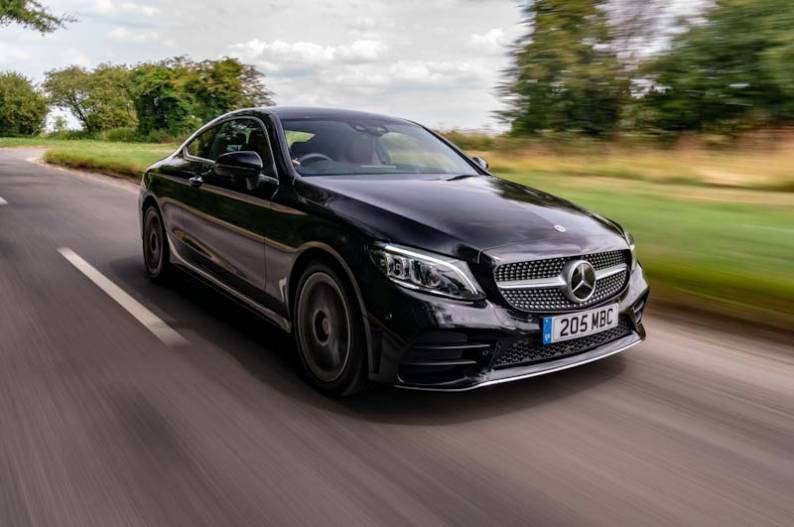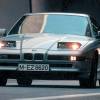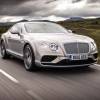
RAC sale – up to 33% off*
• Roadside cover from £5.29 a month†
• We get to most breakdowns in 60 mins or less
• Our patrols fix 4/5 breakdowns on the spot

This improved Mercedes-Benz C-Class Coupe is better placed than ever before to put one over on its domestic rivals. Jonathan Crouch reports.
Ten Second Review
The smallest coupe that Mercedes-Benz makes could also arguably be said to be the best, at least from the point of view of an enthusiastic driver. This improved second generation C-Class Coupe targets two-door versions of BMW's 4 Series and Audi's A5 more effectively than the Three-Pointed Star has ever managed to do before.
Background
For some time, BMW and Audi had the mid-sized executive coupe sector to themselves; BMW with the 3 Series Coupe model that became the 4 Series Coupe: Audi with its A5. Mercedes introduced a C-Class Coupe model in 2011 to try and face up to these competitors, but it didn't make much headway. Only with the introduction of the second generation C-Class Coupe in 2015 was the Three-Pointed Star finally able to take on its Teutonic rivals at their own game.
Here was a car that handled considerably more sharply than its four-door C-Class showroom stablemate. In fact, it was a good match against an equivalent 4 Series or A5 Coupe model. The only fly in the ointment were the carry-over base petrol and diesel engines that most customers had to be content with. If Mercedes could produce something better in this area, you felt, then it really would have a very complete contender on its hands. Well, with this revised second generation C-Class Coupe design, that's just what the Stuttgart brand has brought us.
Driving Experience
When we first tested the original version of this second generation C-Class coupe, we were particularly impressed by its surprisingly sharp handling dynamics. This attribute continues with the revised range but here, perhaps the most important news is the introduction of fresh mainstream petrol and diesel engines beneath the bonnet. The range kicks off with the 156hp 1.6-litre petrol engine used in the base C180, but ideally, you'd begin your perusal of the line-up with a more modern unit, the 1.5-litre 184hp petrol unit fitted to the base C200, a model available in rear-driven or 4MATIC form. This powerplant features clever 'EQ Boost' technology which uses a 48volt on-board network with a belt-driven starter/alternator. There's also a 258hp 2.0-litre petrol variant, the C300.
Many C-Class Cabriolet customers still want a diesel, usually the 2.0-litre 194hp powerplant fitted to the C220d variant, which can be had in rear-driven or 4MATIC form. There's also a C300d variant with the same engine tuned out to 245hp. At the top of the range lie the fearsome Mercedes-AMG models, offered with V6 or V8 power. The V6-engined C 43 4MATIC now puts out 390hp, 23hp more than before. That's enough to take a C 43 Coupe from rest to 62mph in just 4.7s. Beyond that lies only the V8 C63 S AMG model, with a 4.0-litre V8 Biturbo engine offering 510hp.
Design and Build
The styling of this revised second generation C-class Coupe isn't much different, a revised front bumper slotting under the smart diamond radiator grille which is flanked by standard-fit LED High Performance headlights. As before, a high beltline and frameless doors with free-standing exterior mirrors aim to underscore the sporty character. One particular highlight is the long drawn-out dropping line typical of a coupe. In contrast to the C-Class Saloon, the dropping line extends further past the rear wheel arch. To underscore the Coupe's sporty disposition, the suspension is 15 millimetres lower than that of the Saloon.
Inside, the cabin gets the option of the fully-digital instrument display, a 12.3-inch TFT screen that replaces the conventional dials using technology borrowed from larger Mercedes models. You can customise the layout between three display styles - 'Classic', 'Sport' and 'Progressive'. As before, flowing forms characterise the centre console as well as the door and rear side panelling, which smoothly merge into one another to emphasise the coupe character. There are front sports seats specifically designed for this Coupe variant and featuring automatic belt feeders for added convenience. The choice of materials and the finish have a hand-crafted feel with high-class appeal and aim to deliver a fresh take on modern luxury.
Market and Model
Expect pricing to be much as before, which means that most models will be sold in the £37,000 to £40,000 bracket. There's just one trim level - 'AMG Line' - before you get to the top Mercedes-AMG variants. Intelligent 'MULTIBEAM LED' headlights that adjust to road conditions are now optional. As with all modern Mercedes vehicles, buyers will be attracted by solid build quality and a certain familiarity with the look and feel of the cabin. This coupe sees many of the features that previously only appeared on £50k+ models filtering down to more affordable versions. One example of this is the air conditioning system that uses satellite navigation to detect tunnels. Having identified one, it closes the air recirculation flap automatically when you enter the tunnel to prevent bad smells from filtering into the cabin, then opens it again when you exit.
This revised model features the option of Mercedes' latest 'level 2' autonomous driving technology, with improved camera and radar systems that allow it to see up to 500m ahead. You'll need the optional 'Driving Assistance Package' for that, which features the brand's 'Active Distance Control DISTRONIC' active cruise control system which can draw on navigational data to predictively adjust your speed. Other new developments include intuitively understandable 'Active Lane Change Assist' and 'Active Emergency Stop Assist' as new functions of the existing 'Active Steering Assist' set-up. Plus the capability of the standard Active Brake Assist autonomous braking system has been extended to mitigate the consequences of rear-end collisions with slow-moving, stopping or stationary vehicles.
Cost of Ownership
The 1.5-litre EQ Boost petrol engine fitted to the base C200 enables a useful improvement in efficiency to be possible, so don't automatically opt for a diesel this time round. It puts out 142g/km of CO2 (WLTP) and up to 42.8mpg on the WLTP combined cycle. This unit features a clever starter/alternator that during deceleration recuperates kinetic energy and charges the battery. For auto models, there's also a gliding mode that operates at cruising speeds, switching the engine off, before seamlessly re-starting it when you brush your foot against the throttle. And a 'recuperative brake with intelligent engine stop' function which also works when the vehicle is coasting. Mercedes says that internal friction is much reduced with this new four cylinder unit.
As for the 2.0-litre diesel engine fitted to the C220d, well it performs to the latest super-stringent Euro 6d-TEMP standard and uses a particularly efficient 'step recess' combustion process - named after the shape of the combustion case in the piston. Internal friction is also reduced here - by around 25% - and the engine's more compact, leading to significant efficiency benefits. It puts out 117g/km of CO2 (WLTP) and up to 54.3mpg on the WLTP combined cycle. What else? Well maintenance costs will be kept down thanks to an ASSYST Plus service indicator on the dash that'll calculates precisely when a dealer visit might be needed. And residual values will be as high if not higher than anything else in the class.
Summary
The only area where this second generation C-Class Coupe really needed improvement was when it came to the most affordable petrol and diesel engines. Now that these have been brought up to date, this car looks a very complete package indeed. No luxury brand - come to think of it, no other brand of any kind - offers a wider choice when it comes to coupe motoring than Mercedes-Benz. This C-Class Coupe may be the marque's most affordable offering when it comes to this kind of car, but it still feels of very high quality indeed. But that you would expect. What might be more of a surprise is just how satisfying a driver's machine this model can be, especially in its more powerful forms thanks to clever suspension and a hi-tech range of engines.
The top C 63 AMG variant is a potential BMW M4-beater and even more affordable versions - the volume diesel derivatives for example - can be remarkably rewarding on the right road, even if the sporty AMG add-ons do slightly affect running costs. You could argue that many potential Mercedes buyers won't especially value this car's surprisingly dynamic repertoire - and you might be right. Important though, we think, for the Stuttgart brand to show that it was capable of providing it. If that was the intention, then the job's been done well.







